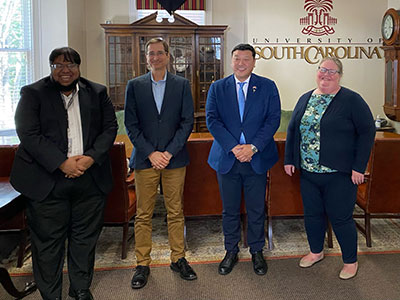Nestled between Russia and China lie the vast mountains, expansive deserts and pristine grasslands of Mongolia. In a country with sparsely populated rural areas and a struggling economy, Mongolia’s government is eager to protect its natural resources and use them thoughtfully. The problem? There’s a bustling—and illegal—trade in trafficked minerals and other extracted goods.
That’s why, when Mongolian Ambassador to the United States Batbayar Ulziidelger came to the University of South Carolina to visit leaders within the Rule of Law Collaborative, he was eager to talk shop with the Collaborative’s team of experienced lawyers and legal experts.
The Rule of Law Collaborative is a university-affiliated research center known nationally for its work in advancing the study of rule of law through government programs and activities in cooperation with expert consultants and local partners. When asked for a definition of the term “rule of law,” co-deputy executive directors Steven Austermiller and Karen Hall laugh. The United Nation’s concise definition of rule of law hovers around 100 words, and the center at USC offers a 90-minute module to new hires explaining what the term encapsulates.
According to Hall, simply put, rule of law is based on the idea of protecting a clear set of laws that are applied equally and consistently to all people, ensuring that people are protected by their governments. “People have a say in what the laws are and how the laws are promulgated. It creates a more fair and expansive way of administering a justice system,” she explains.
This is exactly what the Collaborative has tried to foster in the cities, regions, and countries it serves, from Washington D.C. to Bangladesh. Mongolia’s issue with mineral smuggling is a corruption and enforcement matter largely concentrated at the Russian and Chinese borders. So when Hall suggested that the Collaborative put its funds from the Asia Foundation and U.S. Department of State to work in the border towns of Bayankhongor and Selenge, it caught Ulziidelger’s attention.

Usually, organizations working with the Mongolian government head straight to the capital city, Ulaanbaatar, and Ulziidelger appreciated ROLC’s work in the border towns where much of the mineral trafficking, corruption and bribery is taking place. “[The Mongolian ambassador] is very passionate about getting beyond the capital and helping people in the provinces,” explains Hall. “We were glad to be able to talk to him about that.”
The Collaborative got to work, setting up adult education sessions in three different Mongolian cities and providing simulations for prosecutors, police, and judges. In Ulaanbaatar, Bayankhongor and Selenge, seasoned professionals had the opportunity to engage with new types of evidence and practice skills through a simulation on mineral trafficking and corruption, talking through the details of an imaginary case study to practice crime solving and evidence gathering.
“It got people who needed to work together to sit at the table and do this together,” says Hall. “They learned a lot from the simulation, but also from the ability to work with and network with other people in criminal justice, which is really important.”
The first simulation was so well received that the Collaborative hosted another round in those three cities, introducing a training focused on money laundering. Met with another success, the team has gotten to work on preparing additional education sessions for the coming year, and they are eager to return to Mongolia to learn alongside officials and criminal justice professionals.
“We understand that reform is a really long process, and we understand that we’re engaging in a certain moment of time with a certain subset of problems,” says Hall. “But something that’s been very enjoyable in this project is how willing all of our government partners in the Mongolian government have been to participate and to push a reform agenda. It’s heartening to be able to work in countries where there’s that political will to move the ball forward and see improvements. Working on the Mongolia project has been a real pleasure.”